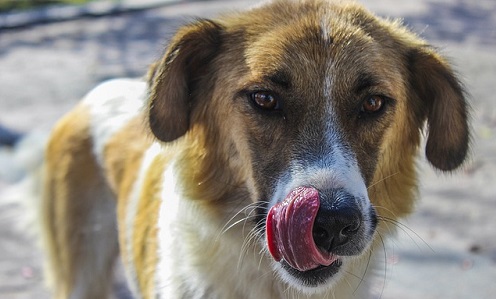Pet owners are constantly trying to determine the best canine nutritional diet for their pet. Fortunately, a lot of the foods we humans consume are also safe for our dogs to consume in moderation. However, there are a number of foods which can be dangerous and toxic for dogs to ingest. Before you decide to give your dog something, be sure you have read Canna-pet’s series of posts on what is safe for him to eat.
So, can dogs eat almonds? The short answer is that almonds are not safe for your canine companion. There are a number of reasons why this is, but fortunately, toxicity is not one of them, unlike some other nuts.
Why are Nuts Bad for Dogs?

There are some nuts which can be fatally toxic for dogs to consume. These include pecans, walnuts, and macadamia nuts which should be avoided. Although not all nuts are toxic, they are still a generally unsafe food to provide to your pup for a number of reasons. First, almost all nuts are high in fat which can increase your dog’s chance of developing pancreatic issues or lead to canine obesity. In addition, most nuts can be a choking hazard for dogs. Nuts can block your dog’s esophagus, intestines, or windpipe. This especially concerning for small breeds. Obstructions like these can be fatal if not treated and may require surgery to correct.
Why are Almonds Unsafe?
While almonds do not fall into the toxic category of nuts, they are still unsafe for the other reasons including, high-fat content, choking hazard, and increased water retention. However, most dogs seem to enjoy the taste of almonds even though they will cause gastrointestinal distress. Symptoms of such distress include:
- Vomiting
- Diarrhea
- Gas
- Loss of Appetite
- Lethargy
- General Discomfort
Flavored or salted almonds also present a set of unique risks. Simply giving your dog salted almonds can increase his water retention which can eventually lead to other health complications. Other flavorings and spices can irritate your dog’s stomach, and they may contain extra salt in the seasoning which can, again, lead to water retention and salt toxicity if consumed in large quantities.
If your dog happens to consume a few almonds, don’t panic. Watch him carefully for signs of gastrointestinal distress or possible obstruction. However, if your dog devours a large number of almonds, call your veterinarian for professional advice and treatment options.
Safe Nuts for Dogs
As we have already discussed, almost all nuts are high in fat. So, in large quantities or on a regular basis no nuts are safe for your pup to consume. However, peanuts and cashews are both in the legume family but are safe for dogs to consume in very small quantities assuming they are unsalted and unseasoned. This includes peanut butter and cashew butter as well. Though they are still very high in fat content and too much can still cause your dog to develop canine pancreatitis, a serious pancreatic issue.
Ultimately, there are many other snacks and treats which are healthier for your dog to consume than nuts. Instead, consider feeding your pet vet-approved dog treats or safe fruits, vegetables, or other whole foods as a reward. Some foods which are safe for dogs to consume include:
- Bread
- Cheese
- Coconut
- Corn
- Eggs
- Fish
- Ham
- Honey
- Popcorn
- Pork
- Quinoa
- Salmon
- Turkey
- Wheat/Grains
- Yogurt
While all of these foods are safe for dogs to consume, you should also give them to your pup in moderation. Too much of anything can be unsafe for your dog. Just as with humans, you should try to find your pet a balanced and well-rounded diet. Before giving your dog any food that is not part of their normal diet, it is best practice to do your research and consult with your veterinarian. Your vet will be able to consider any existing health conditions that your dog already has and advise on what is safest to give him.




